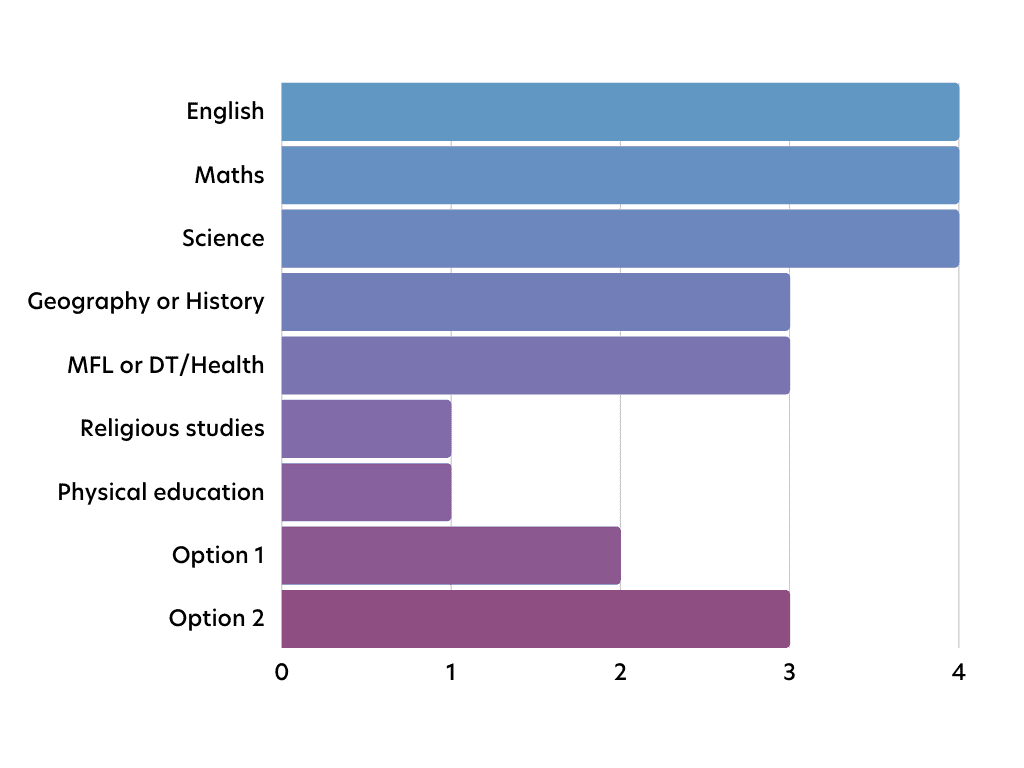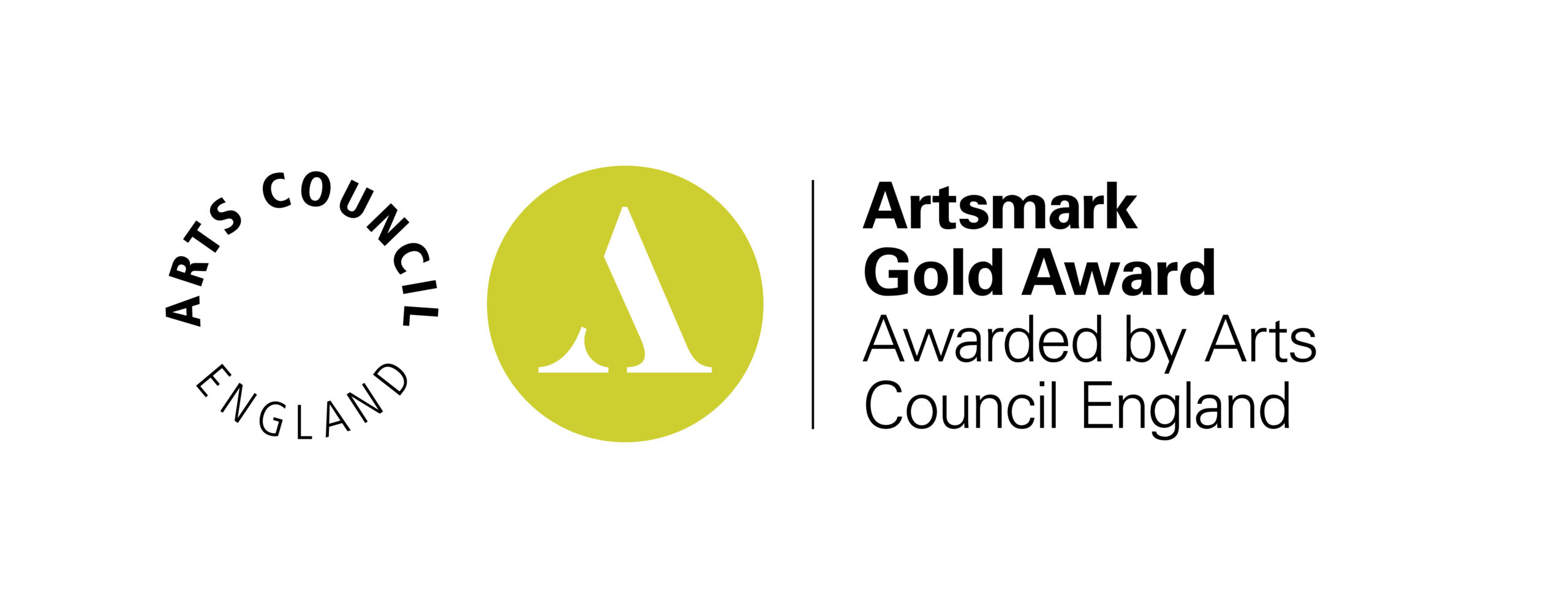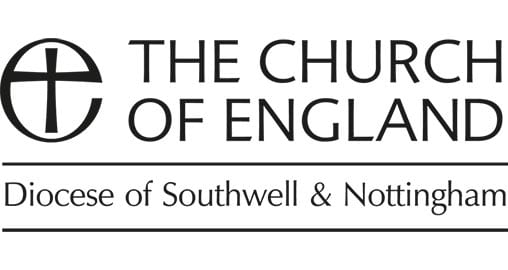In year 10 students have 25 lessons a week, these are allotted as follows:
Number of lessons per subject

Below is a general overview of the topics students are taught throughout the year in each subject.
Students on the Ebacc pathway study English language and literature, maths, physical education and religious education.
They then have three further core options: combined or triple science, geography or history and French or Spanish. After this they choose to pursue two further subjects (if they have chosen triple science this makes up one of their two options).
Students on the Non-Ebacc pathway study the same core subjects as above, however they do not pursue a foreign language and therefore have three options instead of two.
For a more in depth outline of each subject please click on the link for the subject page.
If you would like to speak to us about any aspect of our curriculum please get in touch.
Core subjects
Regardless of whether students follow the Ebacc or Non-Ebacc pathway they will study following subjects.
English language and literature
Autumn term
- GCSE English literature paper 1
- ‘Macbeth’ by William Shakespeare
- ‘Jekyll and Hyde’ by Robert Louis Stevenson
Spring term
- GCSE English language paper 1: creative writing
- GCSE English literature paper 2: unseen poetry
Summer term
- GCSE English literature paper 2
- Poetry Anthology – Power and Conflict
- ‘An Inspector Calls’ by JB Priestley
Maths
Autumn term
- Geometry and measures
– Pythagoras and trigonometry (further)
– Constructions, loci, transformations (further)
– Vectors
– Sectors and arcs
Spring term
- Algebra
– Bounds and error intervals
– Quadratics
– Iteration
– Functions
– Surds
Summer term
- Geometry, ratio/proportion, statistics and probability
– Circle theorems and proof
– Proportionality
– Sampling and averages
– Further probability and venn diagrams
Religious studies
Autumn term
- Christian beliefs
Spring term
- Marriage and the family in Christianity
Summer term
- Muslim beliefs
Physical education
Autumn term
- Football
- Netball
- Badminton
- Basketball
- Indoor games
- Fitness
Spring term
- Rugby
- Handball
- Table tennis
- Hockey
- Volleyball
Summer term
- Athletics
- Rounders
- Cricket
- Softball
- Tennis
Core subject options
Students must then choose between combined or triple science, geography or history and (for Ebacc students) French or Spanish.
Students following the Non-Ebacc pathway will need to choose an additional option in place of a language, see the optional subject list for all subject choices.
Geography
Autumn term
- Challenges of natural hazards
Exploring what a natural hazard is and how they affect human lives. - Urban challenges
How are urban patterns changing and how this is affecting less economically strong nations.
Spring term
- Challenges of natural hazards
Weather; what causes different weather patterns around the world. - Urban issues and challenges
UK Industrial change.
Summer term
- Physical Landscapes – coasts
- Fieldwork
History
Autumn term
- Medicine through time
Spring term
- Historic environment: Western Front
- Germany
Summer term
- Germany
Combined science
Autumn term
- Energy
- Chemical changes
- Infection and response
- Electricity
Spring term
- Bioenergetics
- Energy changes
- Homeostasis and response
- Quantitative chemistry
Summer term
- Forces
- The rate and extent of chemical change
- Waves
- Organic chemistry
Triple science
Biology
- Topics are designed to enable students to understand the living parts of the environment around them and how their own body works. They will learn to use a microscope, investigate how organs within the body work and how scientists monitor the environment.
Chemistry
- Topics will develop students’ understanding of matter and chemical reactions between substances. They will carry out investigations to identify unknown substances and the factors affecting chemical reactions.
Physics
- Topics cover the interactions between matter and energy, electricity and how the physical world works. They will learn how technology advances and how to investigate forces, magnetism and electricity.
French
Autumn Term
- Family and friends
- Technology
Spring Term
- Free time activities
- Customs and festivals
Summer Term
- Home town
- Social issues
Spanish
Autumn Term
- Family and friends
- Technology
Spring Term
- Free time activities
- Customs and festivals
Summer Term
- Home town
- Social issues
Optional subjects
Additionally students choose to study two/three of the subjects listed below (two for Ebacc and three for Non-Ebacc students).
Art and design
Autumn term
- Marine
Spring term
- Marine
- Hands
Summer term
- Hands
- Urban landscape
Child development
Autumn term
- Patterns of child development
In this unit students learn about growth and development in children leading to and understanding the characteristics of children’s development, including milestones, from birth to eight years.
Spring
- Promoting children’s development through play
In unit 2 students learn how play promotes children’s development in early years settings.
Summer term
- Promoting children’s development through play
In the second part of the units students look at different types of play opportunities for each age group and how each supports development. They then go on to look at how play is structured in early years settings.
Dance
- Component 1: exploring the performing arts – internal assessment
- Component 2: developing skills and techniques in the performing arts – internal assessment
- Component 3: responding to a brief synoptic –external assessment
Design and technology
Autumn
Core technical principles
- New and emerging technologies, industry, enterprise, sustainability, people, culture, society, environmental, production techniques and systems.
- Energy generation and storage, fossil fuels, nuclear power, renewable energy, energy storage systems.
- Developments in new materials, smart, modern and composite materials.
- Systems approach to designing, inputs, outputs, processes, manufactured timbers, metal alloys, polymers, textiles material properties
Spring
Specialist technical principles
- Selection of materials or components
- Forces and stresses
- Ecological and social footprint
- Social issues in the design and manufacture of products
- Sources and origins
- How to shape and form using cutting, abrasion and addition
- Mechanical devices
- Different types of movement
- Changing magnitude and direction of forces-levers, linkages, rotary systems
Summer
Non-exam assessment (NEA)
- Scales of production.
- Tools, equipment and processes, commercial processes
- Surface treatments and finishes, quality control
- Stock forms, types and sizes
- Materials and their working properties, papers and boards, natural and manmade
Drama
Autumn term
- Introduction to the Tech Award
Performing arts course including learning about the grading criteria and requirements of the course.
Spring term
- Exploring genre – naturalism: Constantin Stanislavski
Tech Award component 1 project
Summer term
- Exploring genre and performance- physical theatre: frantic assembly
- Tech Award component 1/2 project
Engineering
Autumn
Topic area three will cover the following areas of learning and will be taught from the initial return in September until the October half term.
- Different type of drawings
- Orthographic drawings
- Types of lines
- Experimentation with engineering drawings
- Uses of CAD CAM
Spring
Topic area one will cover the following learning areas.
- Stages involving the design process.
- The engineering design cycle
- Design briefs
- Primary research
- Market research
- Specification writing
- Making principles
Summer
Topic area two will focus on the manufacture of side of engineering the areas of learning that we will be cover are as follows.
- Scale of manufacture and types of processes and production cost
- Market pull, technology push, legislation and standards.
- Sustainable design.
Health and fitness
Unit one
Introduction to body systems and principles of training in health and fitness
Unit two
Preparing and planning for health and fitness
Health and social care
Human lifespan development
Autumn term
Students explore growth and development across the life stages and the different types of development including physical, intellectual, emotional and social, leading to a holistic overview of the individual.
Spring
In the spring term students choose a celebrity and look at the things that have made an impact in their lives, including relationships, social and cultural and economic factors.
Summer
In the final part of this unit students consider the life events that impact on them. These may be expected events such as starting school which usually have a positive impact on development. They then look at the unexpected things that can happen in life, such as accident or redundancy and which are more likely to have a negative impact.
Hospitality and catering
Autumn
Introduction to course content
- Theory: food labelling laws, food safety legislation, food hygiene.
- Practical: how to prepare and make dishes: prepare techniques/knives skills/cooking techniques
- Food safety practices
- Understanding the importance of nutrition and how cooking methods impact on nutritional value
Spring
- Theory: symptoms and signs of food-induced ill health
- Presentation techniques
- Food safety practices
- Hospitality and catering provision
- Practical: how to prepare and make dishes: prepare techniques/knives skills/cooking techniques
- Building preparation and cooking skills and learning through practice
Summer
- Theory: health and safety in hospitality and catering provision.
- Food safety practices
- Practical: how to prepare and make dishes
- Presentation techniques
- Food safety practices
- Reviewing of dishes
- Reviewing own performance
- Building preparation and cooking skills and learning through practice
Visit our hospitality and catering page for more information
Media studies
Students will study the following media forms: television, film, radio, newspapers, magazines, advertising and marketing, social media, video games and music videos.
The course will enable students to develop:
- skills of enquiry, critical thinking, decision making and analysis
- knowledge and understanding of a range of important media issues
- appreciation and critical understanding of the media and its role in society, culture and politics
- how to understand and apply specialist terminology to analyse and compare media products, their context, and reaching conclusions about media issues
- practical skills by providing opportunities for creative media production
Music
Autumn
- BTEC first award in music – Unit 5
Students will take part in regular rehearsal activities designed to develop their technical music performance techniques in relation to their singing voice or chosen musical instrument.
Spring
- BTEC first award in music Unit 5 / Unit 2
Students will learn the about different types of organisations in the music industry and the type of work each undertakes.
Summer
- BTEC first award in music Unit 2 / Unit 1
Students will plan a live concert/event and work collaboratively with a team of peers to plan and prepare the work.
Photography
‘Concealment’ project Component 1 portfolio:
Produce a sustained project and a selection of further work that
represents the course of study. This is worth 60 % of overall marks.
Religious studies (full course)
Autumn term
- Christian beliefs
Spring term
- Living the Christian life
- Marriage and the family in Christianity
Summer term
- Matters of life and death in Christianity
- Muslim beliefs
Sport
- Unit one – fitness for sport and exercise
- Unit two – practical sport
- Unit three – the mind and sports performance
- Unit four – the sports performer in action




